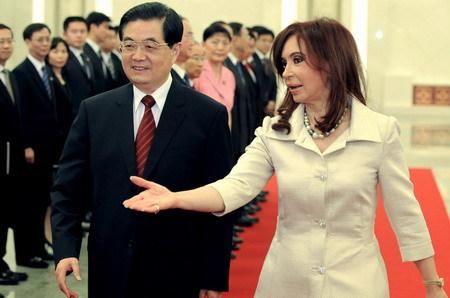
Visiting Argentine President Cristina Fernandez de Kirchner introduces members of her delegation to President Hu Jintao after a welcome ceremony in the Great Hall of the People in Beijing on Tuesday. [China Daily]
China and Argentina signed railway deals totaling US$10 billion on Tuesday, amid efforts by Beijing to forge stronger commercial ties with Latin America.
Twelve agreements were reached between the two countries during Argentine President Cristina Fernandez de Kirchner's five-day visit to China. Six deals were inked at noon, witnessed by Kirchner and Chinese Vice-Premier Hui Liangyu. The rest of the agreements were signed later in the day following talks between Kirchner and her Chinese counterpart Hu Jintao.
The 10 railway projects - ranging from two to five years - include the purchase of Chinese railway technology and investments in Argentina's rail line electrification projects, Argentine Transport Minister Juan Pablo Schiavi told AFP.
Other deals cover areas like infrastructure, fishery, energy, and plant quarantine.
The two countries agreed to collaborate in light rail and subway construction in Argentina. China will also provide export credit to Argentina for purchases of locomotives.
At least three contracts focus on a US$2.5 billion rail renovation project in Argentina's capital Buenos Aires. It requires the Argentine government to purchase materials and technologies for improving railway networks from two Chinese companies: China Northern Railway (CNR) and China Southern Railway (CSR).
During the talks, Hu and Kirchner also expressed wishes to push forward stronger trade ties.
China has become an increasingly important global player in the rail sector as its railway-related exports have been rising fast in the past years.
CSR, one of China's two major railway equipment manufacturers, said it signed contracts to export products worth US$1.2 billion in 2009 alone, compared to less than US$59 million in 2001.
"The exported products are high-end and more developed countries are on our client list," said a source from the corporation, who required anonymity.
CSR, which provides 70 percent of China's bullet trains in operation, is now exploring the markets of developed countries. Last year, it started exporting rapid transit vehicles and freight wagons to Singapore and Australia.
Analysts also expect high-speed railway related technologies and equipment to be the highlight of China's rail export in the future.
Yang Hao, professor in railway transport with Beijing Jiaotong University, said that compared to countries like Germany, France and Japan, China may not be able to excel in a single technology, but its advantage lies in "assembly" - absorbing advanced single technologies and bringing them together in one railway project.
To that effect, the Ministry of Railways has introduced high-speed train technologies from France, Germany and Japan in the past years, while making its own innovations.
"Absorbing others' strong points adds to China's competitiveness in the sector, in addition to other advantages such as lower construction cost and a shorter construction period," he said.
In China, it usually takes three to four years to build a high-speed railway. At least 10,000 km of high-speed rail line is now under construction.
As a newcomer in the high-speed railway market, China still has to learn to better meet the needs of potential clients, Yang said.
Earlier reports said the ministry wants to export China's high-speed railway technology to North America, Europe and Latin America.
Wang Zhiguo, vice-minister of railways, said in March that China's State-owned companies are already building high-speed lines in Turkey and Venezuela. Many countries, including the United States, Russia, Brazil and Saudi Arabia, have also expressed interest.





